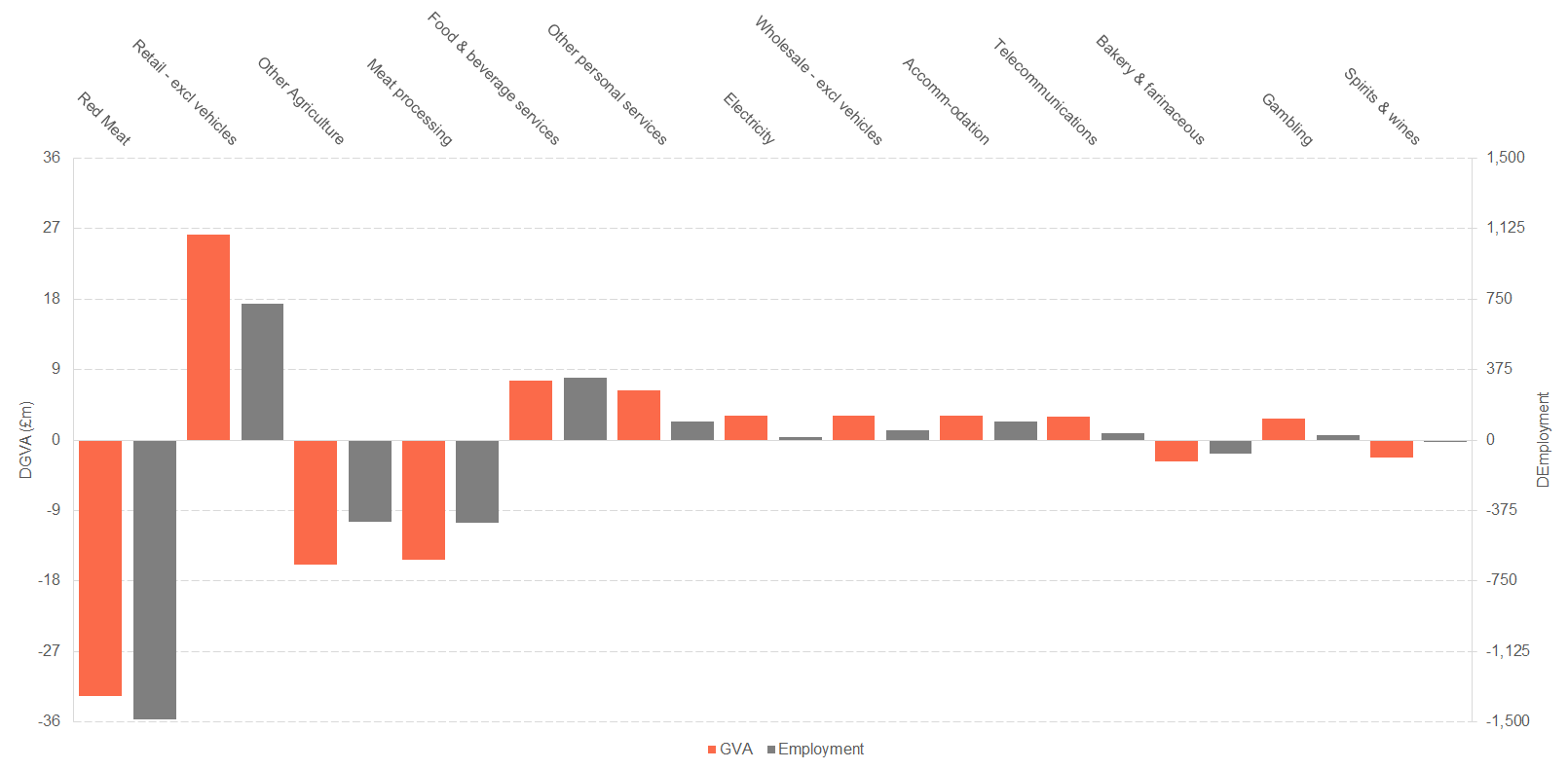David Comerford, Fraser of Allander Institute
As part of a project now underway at the Fraser of Allander Institute, we are considering the climate change and macroeconomic impacts of a change in demand toward a more healthy diet on the Scottish environment and economy.
In this blog we summarise some of the initial results from the analysis.
It has been argued that red meat can be an inefficient and carbon intensive way of generating calories for human consumption. For each calorie of meat produced, many calories of grain and other vegetable crops have to be grown to feed livestock. To the extent that arable farming has a certain emissions consequence per human calorie supplied, livestock production clearly multiplies these emissions per calorie produced. And, this is before we take into consideration the methane produced by livestock, which further adds to climate change emissions.
So, red meat consumption matters for climate change. It also matters for health. Red meat is a good source of protein and provides important vitamins and minerals, such as iron and zinc. However, many health practitioners advise that whilst red meat can form part of a healthy and balanced diet, there is some evidence that excessively high consumption of red and processed meats can be associated with increased incidence of certain poor health outcomes.
This suggests the prospect of a policy win-win: if, somehow, we can eat in accordance with healthy eating guidelines (reducing calorie intake generally, but also from red meat consumption) then not only will it help meet health policy outcomes, it may also reduce climate change emissions with consequential environmental benefit.
In a study conducted by researchers at the Oxford Martin School, Springmann et al (2016) found that “transitioning toward more plant-based diets that are in line with standard dietary guidelines could reduce global mortality by 6–10% and food-related greenhouse gas emissions by 29–70% compared with a reference scenario in 2050”. So such a dietary shift could have positive health and environmental benefits, but what might be the economic impacts?
Springmann et al (2016) do not consider the economic impact of such a dietary shift. However, if demand for food, and especially red meat, falls then, in the absence of any increases in demand for other goods, GDP and employment are likely to fall too. The Scottish Government aims to create “a more successful country, with opportunities for all of Scotland to flourish, through increasing sustainable economic growth”. This implies that economic concerns may work against improving health outcomes and the environment. But could a move towards the healthy eating guidelines actually produce such a triple-win?
As part of a project now underway at the Fraser of Allander Institute, we consider the climate change and macroeconomic impacts of such a change in consumer demands toward a more healthy diet in Scotland on the Scottish environment and economy.
As an illustration, we take the healthy eating guidelines described in Springmann et al (2016) to model a reduction in household demand for red meat by 39%, reduce their demand for other food and drink by 3%, and we further assume that households use the money saved to increase their demand for other goods and services (in proportion to current expenditure) by 0.5% in order for total household spending to be unchanged.
Unchanged total household expenditure is reallocated away from food and drink, and this leads to a reduction in GVA (wages plus profits) and employment associated with the food sectors, and in the sectors which supply inputs to the food sectors. However, as shown in Figure 1, there are corresponding increases in GVA and employment in non-food and drink sectors (especially retail), and in the sectors which supply inputs to these sectors. The net effect of this expenditure shift is approximately unchanged total GDP, employment and trade balance.
Figure 1: Changes in GVA & Employment for 13 sectors with biggest absolute GVA changes
Despite the unchanged GDP and Employment position, carbon emissions generated within the Scottish economy fall by 0.9% (around 0.5MtCO2e), and emissions generated outwith Scotland but on behalf of Scottish consumers are reduced by 0.2MtCO2e. Scotland’s carbon footprint falls by 0.7%. Households have substituted their spending away from food and drink towards other sectors. This additional economic activity is associated with increased carbon emissions from these sectors. But the result of this shift in aggregate demand is that GDP and employment are largely unchanged; but total carbon emissions fall, because activity has moved from high emission sectors (red meat production etc.) to lower emission sectors (e.g. retail).
Of course, this illustrative analysis also shows that there would be significant impacts within the agriculture sector with many existing activities impacted. If such a shift in diet was to become part of any policy initiative, then clearly how firms and workers in the areas negatively impacted were supported would be crucial.
In summary, at a macroeconomic level the potential exists in Scotland to shift consumer spending away from food and drink, and especially away from red meat, to reduce carbon emissions without harming Scotland’s overall economic performance. This result is before taking into account any economic benefits arising from the health impacts that may come from such a change (such as reduced healthcare costs and improved workforce productivity).
The debate over the environmental and health impacts of different types of diet will continue, what this analysis shows is that not only are economic factors important but that the potential impact of changes in diet may be slightly more nuanced than would appear at first glance.
This blog is an abridged version of Comerford, D. (2017) “The carbon emissions and economic impact of healthy eating in Scotland”, Fraser of Allander Commentary, June 2017: volume 41, number 2
Authors
The Fraser of Allander Institute (FAI) is a leading economy research institute based in the Department of Economics at the University of Strathclyde, Glasgow.
